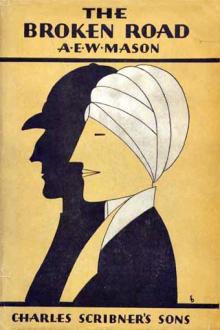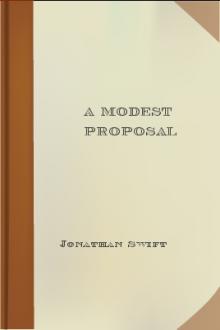The Devil's Dictionary by Ambrose Bierce (good novels to read in english TXT) 📗

- Author: Ambrose Bierce
Book online «The Devil's Dictionary by Ambrose Bierce (good novels to read in english TXT) 📗». Author Ambrose Bierce
"I don't hear any band," said Schley.
"Come to think, I don't either," said Joy; "but I see General Miles coming down the avenue, and that pageant always affects me in the same way as a brass band. One has to scrutinize one's impressions pretty closely, or one will mistake their origin."
While the Admiral was digesting this hasty meal of philosophy General Miles passed in review, a spectacle of impressive dignity. When the tail of the seeming procession had passed and the two observers had recovered from the transient blindness caused by its effulgence—
"He seems to be enjoying himself," said the Admiral.
"There is nothing," assented Joy, thoughtfully, "that he enjoys one-half so well."
The illustrious statesman, Champ Clark, once lived about a mile from the village of Jebigue, in Missouri. One day he rode into town on a favorite mule, and, hitching the beast on the sunny side of a street, in front of a saloon, he went inside in his character of teetotaler, to apprise the barkeeper that wine is a mocker. It was a dreadfully hot day. Pretty soon a neighbor came in and seeing Clark, said:
"Champ, it is not right to leave that mule out there in the sun. He'll roast, sure!—he was smoking as I passed him."
"O, he's all right," said Clark, lightly; "he's an inveterate smoker."
The neighbor took a lemonade, but shook his head and repeated that it was not right.
He was a conspirator. There had been a fire the night before: a stable just around the corner had burned and a number of horses had put on their immortality, among them a young colt, which was roasted to a rich nut-brown. Some of the boys had turned Mr. Clark's mule loose and substituted the mortal part of the colt. Presently another man entered the saloon.
"For mercy's sake!" he said, taking it with sugar, "do remove that mule, barkeeper: it smells."
"Yes," interposed Clark, "that animal has the best nose in Missouri. But if he doesn't mind, you shouldn't."
In the course of human events Mr. Clark went out, and there, apparently, lay the incinerated and shrunken remains of his charger. The boys did not have any fun out of Mr. Clarke, who looked at the body and, with the non-committal expression to which he owes so much of his political preferment, went away. But walking home late that night he saw his mule standing silent and solemn by the wayside in the misty moonlight. Mentioning the name of Helen Blazes with uncommon emphasis, Mr. Clark took the back track as hard as ever he could hook it, and passed the night in town.
General H.H. Wotherspoon, president of the Army War College, has a pet rib-nosed baboon, an animal of uncommon intelligence but imperfectly beautiful. Returning to his apartment one evening, the General was surprised and pained to find Adam (for so the creature is named, the general being a Darwinian) sitting up for him and wearing his master's best uniform coat, epaulettes and all.
"You confounded remote ancestor!" thundered the great strategist, "what do you mean by being out of bed after naps?—and with my coat on!"
Adam rose and with a reproachful look got down on all fours in the manner of his kind and, scuffling across the room to a table, returned with a visiting-card: General Barry had called and, judging by an empty champagne bottle and several cigar-stumps, had been hospitably entertained while waiting. The general apologized to his faithful progenitor and retired. The next day he met General Barry, who said:
"Spoon, old man, when leaving you last evening I forgot to ask you about those excellent cigars. Where did you get them?"
General Wotherspoon did not deign to reply, but walked away.
"Pardon me, please," said Barry, moving after him; "I was joking of course. Why, I knew it was not you before I had been in the room fifteen minutes."
SUCCESS, n. The one unpardonable sin against one's fellows. In literature, and particularly in poetry, the elements of success are exceedingly simple, and are admirably set forth in the following lines by the reverend Father Gassalasca Jape, entitled, for some mysterious reason, "John A. Joyce."
The bard who would prosper must carry a book, Do his thinking in prose and wear A crimson cravat, a far-away look And a head of hexameter hair. Be thin in your thought and your body'll be fat; If you wear your hair long you needn't your hat.SUFFRAGE, n. Expression of opinion by means of a ballot. The right of suffrage (which is held to be both a privilege and a duty) means, as commonly interpreted, the right to vote for the man of another man's choice, and is highly prized. Refusal to do so has the bad name of "incivism." The incivilian, however, cannot be properly arraigned for his crime, for there is no legitimate accuser. If the accuser is himself guilty he has no standing in the court of opinion; if not, he profits by the crime, for A's abstention from voting gives greater weight to the vote of B. By female suffrage is meant the right of a woman to vote as some man tells her to. It is based on female responsibility, which is somewhat limited. The woman most eager to jump out of her petticoat to assert her rights is first to jump back into it when threatened with a switching for misusing them.
SYCOPHANT, n. One who approaches Greatness on his belly so that he may not be commanded to turn and be kicked. He is sometimes an editor.
As the lean leech, its victim found, is pleased To fix itself upon a part diseased Till, its black hide distended with bad blood, It drops to die of surfeit in the mud, So the base sycophant with joy descries His neighbor's weak spot and his mouth applies, Gorges and prospers like the leech, although, Unlike that reptile, he will not let go. Gelasma, if it paid you to devote Your talent to the service of a goat, Showing by forceful logic that its beard Is more than Aaron's fit to be revered; If to the task of honoring its smell Profit had prompted you, and love as well, The world would benefit at last by you And wealthy malefactors weep anew— Your favor for a moment's space denied And to the nobler object turned aside. Is't not enough that thrifty millionaires Who loot in freight and spoliate in fares, Or, cursed with consciences that bid them fly To safer villainies of darker dye, Forswearing robbery and fain, instead, To steal (they call it "cornering") our bread May see you groveling their boots to lick And begging for the favor of a kick? Still must you follow to the bitter end Your sycophantic disposition's trend, And in your eagerness to please the rich Hunt hungry sinners to their final ditch? In Morgan's praise you smite the sounding wire, And sing hosannas to great Havemeyer! What's Satan done that him you should eschew? He too is reeking rich—deducting you.SYLLOGISM, n. A logical formula consisting of a major and a minor assumption and an inconsequent. (See LOGIC.)
SYLPH, n. An immaterial but visible being that inhabited the air when the air was an element and before it was fatally polluted with factory smoke, sewer gas and similar products of civilization. Sylphs were allied to gnomes, nymphs and salamanders, which dwelt, respectively, in earth, water and fire, all now insalubrious. Sylphs, like fowls of the air, were male and female, to no purpose, apparently, for if they had progeny they must have nested in inaccessible places, none of the chicks having ever been seen.





Comments (0)